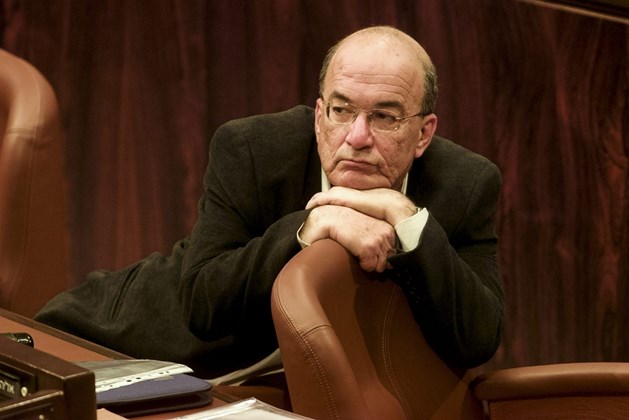Yossi Sarid, a rare voice among Israeli politicians, died from a heart attack on Friday, December 4 at the age of 75. Mostly known for his dovishness and relentlessly sharp criticism of Israel’s treatment of Palestinians, he was also a staunch supporter of Armenian Genocide recognition in spite of Israel’s official position of silence, a frequent and fearless critic of its hypocritical denial. He was lauded at his funeral on December 6 for being a “courageous, wise, stubborn, and perceptive man.”
Sarid was first elected to the Knesset, or Israeli Parliament, in 1973, where he served for three decades, including as founder of Israel’s secular-left wing party Meretz. In the 1990s, Sarid served as Minister of the Environment under Prime Minister Yitzhak Rabin. Sarid’s last role in Israeli politics was as Minister of Education until he retired to become a journalist, particularly as a writer for the liberal Israeli publication Haaretz.
In 2000, Sarid was the first ever Israeli minister to attend the Armenian Genocide commemoration in Jerusalem, where an Armenian population has resided since the fourth century and in increased numbers since the Genocide. At this commemoration, Sarid presented a speech stating that he would “make every effort to see to it that Israeli children will learn, and be knowledgeable about, the murder of the Armenian nation.” He also argued that “a central goal” of the Israeli school system “is to nurture sensitivity toward the suffering of innocent individuals whose sole ‘crime’ is their ethnic identity,” stating that “those who choose to turn a blind eye, who feel they have all sorts of accounts to settle, who remain silent, are only helping the murderers.”
Yet despite of the commonalities and direct connections between the historical tragedies of Jews and Armenians, Israel still does not officially recognize the Armenian Genocide, nor is it covered in the Israeli curriculum today. Sarid, however, had no qualms about putting aside Israel’s diplomatic interest with Turkey for the sake of genocide recognition.
Sarid’s words in 2000 sparked Turkey to demand an explanation from the Israeli government, which then denied responsibility as Sarid explained he spoke for himself. Five years later in Yerevan, during his address at the International Conference on the 90th Anniversary of the Armenian Genocide, he suggested that the second main motive for Israel’s position, aside from relations with Turkey, is the fear of acknowledging the “addition of another genocide as if it takes away from the uniqueness of the Holocaust.”
Sarid, however, had no qualms about putting aside Israel’s diplomatic interest with Turkey for the sake of genocide recognition.
In 2010, Sarid wrote about a conversation with an “important Israeli personality” that reflects the way that Israel has more or less used Armenian genocide recognition as a bargaining chip, shifting its support for the Turkish denialist lobby in the US according in retaliation for Turkey’s condemnation of Israel’s actions towards Palestinians as ‘genocidal.’ In 2009, after Turkish then-Prime Minister and current President Erdogan once again “poured bitter words on Israel,” Sarid was told to “hit back at the Turks, to denounce them for the crimes they committed against the Armenians,” as he was known for doing many times before. Sarid responded, “Now you remembered? Only now, when they attribute crimes to you as if you were Turks?”
On the centennial commemoration of the genocide in April 2015, Sarid connected Israel’s hold on its “monopoly on victimhood” to its “custody of the universal conscience,” which he constantly challenges through his critiques of his own country.
The significance of Sarid’s voice on the Armenian Genocide lies in his outspokenness in general as part of a society where many fear to publicly challenge commonly accepted views. Perhaps the only other prominent Israeli politician known for speaking up about genocide recognition is current President Rivlin. It is hoped that both Israeli civil society and politicians can follow the inspiring legacy of Sarid by acknowledging that which should bring the Jewish and Armenian communities together rather than pull them apart
Melanie Nakashian

















